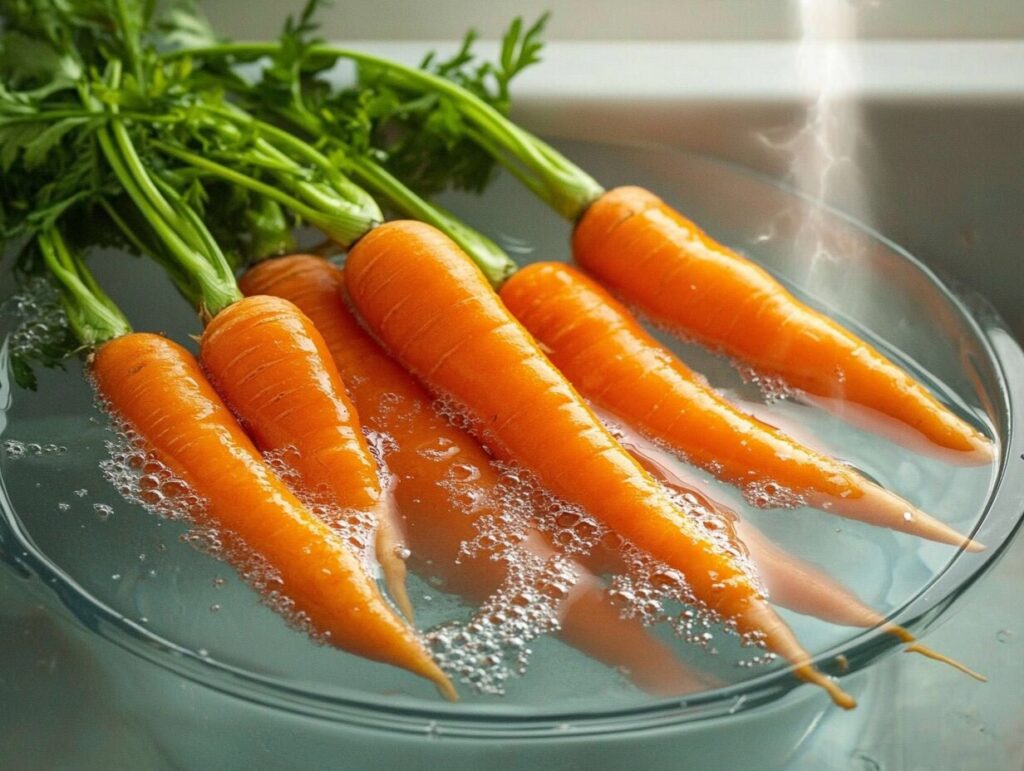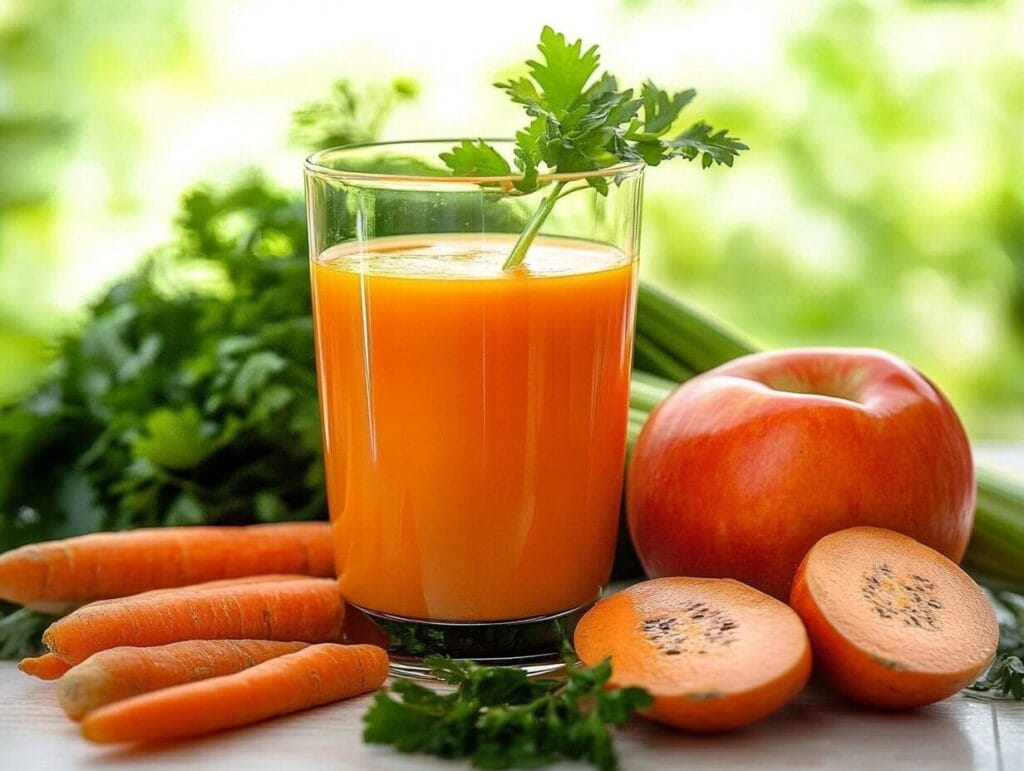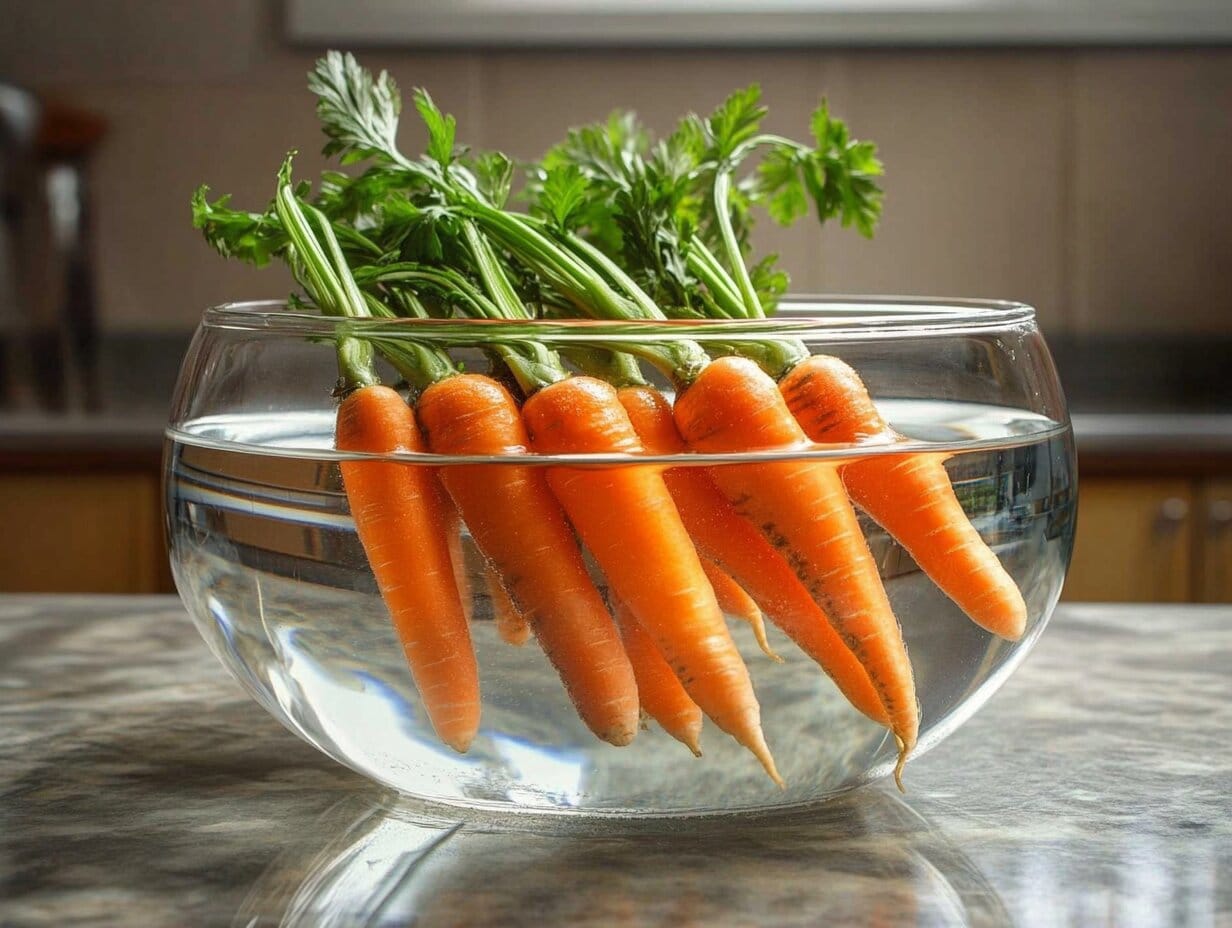Juicing is an art, isn’t it? Freshly pressed carrot juice is a powerhouse of nutrients, a treat for your taste buds, and a vibrant addition to any wellness routine. But, if you’re asking, “Should you soak carrots in water before juicing?”—you’re not alone. It’s one of those deceptively simple questions with a surprisingly layered answer. Let’s dig in and figure it out!
Understanding the Juicing Process
Juicing is more than throwing fruits and vegetables into a machine and hoping for the best. It’s about coaxing the maximum nutrients and flavor from your produce while maintaining the integrity of its natural goodness. When it comes to carrots, they’re a top choice for their earthy sweetness and vibrant orange hue.
Why Juicing Carrots Is Popular
Carrots are like the Swiss Army knives of the juicing world—versatile, nutritious, and easy to work with. Packed with beta-carotene, they boost your vitamin A levels, improve skin health, and may even enhance your vision. Plus, their natural sweetness complements a range of other ingredients, making them a favorite in green juices, detox blends, and fruity concoctions.
Imagine a morning routine where the first sip of your day comes from freshly juiced carrots. Doesn’t it feel like a little ray of sunshine in a glass?
Nutritional Benefits of Fresh Carrot Juice
Carrot juice is a nutritional goldmine. A single glass can deliver:
- Vitamin A: Supports eye health and boosts immunity.
- Potassium: Balances your electrolytes and supports heart health.
- Antioxidants: Help reduce inflammation and combat free radicals.
And let’s not forget—carrot juice is hydrating, low in calories, and naturally energizing. What’s not to love?
Preparing Carrots for Juicing: To Soak or Not to Soak?
Now that we’re sold on juicing carrots, let’s talk about preparation. Whether or not to soak your carrots starts with understanding how to properly prep them. It’s all about preserving their flavor and nutrition while avoiding common mistakes.
Should You Wash Carrots Thoroughly?
Absolutely! Carrots grow underground, which means they’re often covered in dirt, bacteria, and even pesticide residues. Washing them thoroughly under running water is non-negotiable.
Pro Tip: Use a vegetable brush to scrub away stubborn dirt. This simple step ensures your juice doesn’t end up tasting, well, earthy in all the wrong ways.
Common Prep Mistakes to Avoid
It’s easy to take shortcuts in the kitchen, but when it comes to juicing, they can backfire. Here are a few common mistakes to steer clear of:
- Skipping the Wash: Even organic carrots need a good rinse to remove dirt.
- Peeling Unnecessarily: While peeling removes the skin, it also strips away valuable nutrients and fiber.
- Ignoring Rotten Spots: A single bad carrot can ruin an entire batch of juice.
Taking a few extra minutes to prep your carrots properly can make a world of difference in taste and quality.
Should You Soak Carrots in Water Before Juicing: Is It Necessary?

Ah, the big question! Does soaking carrots before juicing really make a difference? The answer depends on what you’re aiming for—improved taste, better texture, or enhanced cleanliness.
The Purpose of Soaking Vegetables
Soaking vegetables, including carrots, is a traditional practice that serves several purposes:
- Cleaning: Soaking helps dislodge stubborn dirt particles.
- Rehydration: If carrots are slightly wilted, soaking them in cold water can restore their crispness.
- Taste: Soaking may neutralize any bitterness and enhance the natural sweetness of carrots.
Block Quote Example 1:
“Soaking your carrots can feel like a meditative ritual—giving you a moment to connect with your food and its journey from soil to table.”
Does Soaking Affect Nutrient Content?
A big concern for juicing enthusiasts is whether soaking carrots leaches nutrients. Here’s the good news: soaking carrots in cold water for a short time is unlikely to cause significant nutrient loss. However, extended soaking, especially in hot water, could dilute water-soluble vitamins like vitamin C.
Pros and Cons of Soaking Carrots
Let’s break it down further. There are both benefits and potential downsides to soaking your carrots before juicing.
Benefits of Soaking Before Juicing
Soaking carrots in water before juicing is more than just a cleaning method; it also enhances the juicing process. If you’ve ever wondered, “Should you soak carrots in water before juicing?”, the benefits include:
- Improved Cleanliness: Ensures dirt and residues are fully removed.
- Enhanced Texture: Rehydrated carrots juice more easily, reducing strain on your juicer.
- Better Taste: Brings out the natural sweetness and removes bitterness.
Potential Downsides of Soaking Carrots
- Time-Consuming: Soaking adds an extra step to your prep routine.
- Nutrient Dilution Risk: Prolonged soaking may cause some nutrient loss.
- Overhydration: Excess water can dilute the juice, impacting its flavor.
How Soaking Impacts Juice Quality
Does soaking carrots before juicing change the game? Well, the quality of your juice can depend on how you prepare your carrots, and soaking has a few unique effects that are worth exploring.
Taste and Texture Changes
One noticeable difference after soaking carrots is the flavor. Soaked carrots often taste sweeter and fresher, as the soaking process helps remove any residual bitterness. This translates into a smoother, more balanced juice—ideal for sipping or mixing with other fruits and vegetables.
Texture is another aspect that gets a boost. Rehydrated carrots are slightly softer, which means they break down more easily during juicing. This not only reduces wear and tear on your juicer but also results in a creamier, more consistent juice.
Effects on Juice Clarity and Yield
Did you know that soaking carrots can influence the clarity of your juice? By removing dirt and debris through soaking, the final product is less likely to contain cloudy particles. As for yield, soaking helps rehydrate carrots, ensuring they are at their juiciest when processed.
However, there’s a caveat: if carrots are oversaturated, they may release excess water, diluting the juice slightly. To avoid this, limit soaking to about 15–20 minutes.
Alternative Preparation Methods for Carrots When Juicing

Not sold on soaking? No problem! There are several other ways to prep your carrots for juicing that are just as effective.
Scrubbing Versus Peeling
If you want to skip soaking, a thorough scrub under running water is a great alternative. Use a firm vegetable brush to remove dirt, especially around the carrot’s crevices.
Peeling is another option, though it’s not always necessary. While it creates a smoother juice by removing the tough skin, it also reduces fiber and nutrient content. A good rule of thumb? Peel only if the carrots are old, rough, or have blemished skins.
Using Organic Carrots: Is It Different?
Organic carrots are often marketed as “ready to eat,” but they still need proper cleaning before juicing. The good news? They are less likely to have pesticide residues, so you can skip the peeling and simply scrub or soak them for a few minutes.
Non-organic carrots, on the other hand, may benefit more from soaking to remove potential chemical residues.
Expert Opinions on Soaking Carrots
To soak or not to soak—what do the pros say? Experts in nutrition, cooking, and juicing have a range of opinions on this topic.
Insights from Nutritionists and Chefs
Nutritionists often recommend soaking carrots if they appear wilted or have been sitting in storage for a while. According to them, “Soaking carrots in cold water can revive their texture and enhance their natural sweetness, making for a more enjoyable juice.”
Chefs, however, tend to focus on efficiency. Many suggest that a good scrub is usually enough, especially when working with fresh, high-quality carrots.
What Juicing Enthusiasts Say
The juicing community has mixed feelings about soaking carrots. Some swear by it for achieving a cleaner, sweeter juice, while others consider it an unnecessary step. For many, it boils down to personal preference and the quality of the carrots being used.
Common Juicing Problems and Solutions
Juicing isn’t always smooth sailing. Here are some common issues you might face when juicing carrots and how to solve them.
Dealing with Bitter or Bland Juice
If your carrot juice tastes bitter or bland, the carrots themselves may be to blame. Old or improperly stored carrots can develop an off-taste.
Solution: Always use fresh, crisp carrots. Soaking them in cold water can also help neutralize bitterness.
Overcoming Low Juice Yields
Struggling to get enough juice from your carrots? This could be due to dehydration or insufficient prep.
Solution: Rehydrate wilted carrots by soaking them for 10–15 minutes, or opt for juicier varieties like Nantes or Danvers.
Tips for Getting the Best Carrot Juice
Ready to elevate your juicing game? Here are some pro tips to help you create the ultimate carrot juice.
Combining Carrots with Other Ingredients
Carrots are fantastic on their own, but they also play well with others. Pair them with:
- Oranges: For a vitamin-packed citrus punch.
- Ginger: To add a spicy kick and digestive benefits.
- Apples: For a natural sweetness that balances the earthy flavor of carrots.
Storage Tips for Fresh Carrot Juice
Fresh juice is best consumed immediately, but if you need to store it:
- Use an airtight glass container to prevent oxidation.
- Refrigerate immediately to preserve nutrients.
- Consume within 24–48 hours for maximum freshness and flavor.
Final Verdict: Should You Soak or Skip?
So, should you soak carrots in water before juicing? It depends on your goals. If you want sweeter, cleaner juice and don’t mind the extra prep, soaking is a fantastic option. However, if you’re short on time or have fresh, organic carrots, a good scrub may be all you need.
At the end of the day, juicing is as much about experimentation as it is about following rules. Try both methods and see which one fits your routine and taste preferences best. Happy juicing!
Exploring the Science Behind Soaking Carrots
Beyond the practical benefits, understanding the science of soaking carrots can make the process feel even more purposeful. After all, food preparation is as much about chemistry as it is about artistry.
How Soaking Removes Impurities
When carrots are soaked in water, particularly cold water, the liquid penetrates the outer layers, loosening dirt, sand, and even some chemical residues. This process is especially helpful for carrots grown in clay-heavy soils, where stubborn dirt tends to cling. The result? Cleaner carrots and a fresher juice.
Soaking also acts as a mild detox for the vegetable. Studies show that submerging vegetables in water for a short period can reduce traces of surface pesticides. While scrubbing removes physical dirt, soaking helps to rinse away the invisible stuff.
The Role of Temperature in Soaking
Should you use cold or warm water to soak carrots? Cold water is generally the best choice. It keeps the carrots crisp and prevents nutrient loss, whereas warm water might speed up nutrient degradation and alter the texture of the vegetable.
For extra dirty carrots, some enthusiasts recommend adding a splash of vinegar or a pinch of baking soda to the soaking water. Both act as natural cleaning agents that break down waxy coatings or persistent grime.
Debunking Myths About Soaking Carrots
The internet is full of advice about food prep, and not all of it holds water (pun intended). Let’s address some myths about soaking carrots before juicing.
Myth: Soaking Carrots for Hours Boosts Flavor
While soaking carrots can enhance their sweetness, leaving them in water for too long doesn’t increase flavor—it can actually dilute it. Extended soaking may cause water-soluble nutrients, like vitamin C, to leach out. This is why a short soak (no more than 15–20 minutes) is recommended.
Myth: Soaking Is Only for Non-Organic Carrots
While organic carrots are grown without synthetic pesticides, they are still exposed to dirt and bacteria in the soil. Soaking organic carrots is just as beneficial for cleaning and enhancing texture as it is for conventional ones.
Tips for Busy Juicing Enthusiasts
Juicing is rewarding, but let’s face it—it can be time-consuming. Here are some hacks to simplify your carrot prep without compromising on quality.
Pre-Wash and Store Your Carrots
Want to save time? Wash, scrub, and soak your carrots in bulk as soon as you bring them home. Dry them thoroughly and store them in an airtight container in the fridge. This way, they’re ready to go whenever the juicing mood strikes.
Invest in a High-Quality Juicer
A powerful juicer can handle even minimally prepped carrots, cutting down on prep time. Masticating juicers are especially effective for tougher vegetables like carrots, extracting more juice with less effort.
Freeze Carrot Juice for Later
If you’re short on time during the week, consider juicing in larger batches and freezing portions. Use silicone ice cube trays to freeze individual servings that can be thawed as needed. While fresh juice is always best, freezing is a good compromise for those hectic mornings.
Spiced Carrot Bliss
- 4 carrots
- 1/2 teaspoon cinnamon
- 1/2 teaspoon nutmeg
FAQs
Can soaking carrots reduce their sugar content?
No, soaking doesn’t affect the sugar content of carrots. It can, however, make them taste sweeter by neutralizing bitterness.
What happens if you skip soaking carrots before juicing?
Skipping soaking won’t ruin your juice, but it might result in a slightly grittier texture and a less clean flavor.
Can you drink carrot juice every day?
Yes! Carrot juice is rich in nutrients and can be a healthy daily habit. Just be mindful of portion sizes to avoid overconsuming natural sugars.
What other vegetables benefit from soaking?
Leafy greens, celery, and cucumbers can all benefit from soaking to remove dirt and enhance freshness.
How do you keep carrot juice fresh for longer?
Store carrot juice in an airtight container in the fridge and consume it within 48 hours to retain its flavor and nutrients.
Should you soak carrots in water before juicing if they are organic? Even organic carrots benefit from soaking in water before juicing to remove any residual dirt and enhance sweetness.”
Final Thoughts
The decision to soak carrots before juicing isn’t a one-size-fits-all answer. It’s about finding what works for your routine, your taste preferences, and the quality of the carrots you use. Whether you choose to soak, scrub, or peel, the end goal is the same—delicious, nutrient-packed carrot juice that energizes your day.
After considering the pros and cons, the question remains: “Should you soak carrots in water before juicing?” The answer depends on your priorities. If you want the cleanest, sweetest juice, soaking is worth the extra effort. However, scrubbing or peeling can also do the job if time is tight.

